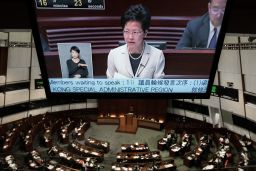Story highlights
Hong Kong's legislature rejects Beijing-backed electoral reform proposal
8 voted for, 28 voted against: Some lawmakers walked out
NEW: China says any future reform must still adhere to vetoed proposal
A bill proposed by the Chinese government that would have allowed Hong Kong residents to vote for their next leader – as long as the candidates were approved by Beijing – has been rejected by the city’s legislature.
In a vote Thursday, 28 out of Hong Kong’s 70 lawmakers rejected the proposal. Eight voted in favor.
As voting began, a large group of pro-government legislators attempted to stall the vote with a last-minute walkout of the chamber – but the vote continued without them, leading to the bill’s hefty defeat.
The result was seen as a rebuke to the Chinese government, which has tried to bring Hong Kong closer to the mainland since it was returned from British rule in 1997.
The bill was the subject of much contention in Hong Kong and came in the wake of massive street protests that gripped the city last fall.
Democracy supporters had refused to accept the proposal, saying that electing candidates vetted and approved by a Beijing loyalist committee would amount to “fake universal suffrage.”
Pro-democracy legislator Albert Chan, who voted against the bill, called the result a “victory.”
“We do not want to have a fake democratic system in Hong Kong,” he told CNN. “We want to continue fight for genuine democracy.”
But Regina Ip, a pro-Beijing lawmaker, told CNN the result was “highly regrettable… this does not bode well for governance.”
Bitter division
The vote brought little resolution after years of intense disagreement over how to establish universal suffrage in Hong Kong – a promise made to the city when it was returned from British to Chinese rule 17 years ago.
Establishment lawmakers said the defeated bill would have fulfilled that long-awaited promise. But democracy supporters disagreed.
“We are not gullible. We will not buy into such delusions for the sake of a quiet life,” said legislator Claudia Mo during debate over the bill. “We have no choice but to vote against it.”

Now, the electoral reform process has effectively stalled.
Hong Kong and China’s governments have insisted there can be no new reform proposals, and have hinted at consequences for those who opposed them this time around.
“As to who should be held liable, I think the answer is clear,” said Carrie Lam, Hong Kong’s chief secretary and the city’s number two official, in the final moments of the bill’s debate.
Accusing pro-democracy legislators of holding the city “hostage,” she said democratic elections might now be “dream that’s never realized.”
In an editorial, China’s state-run Global Times said the vote was a “humiliation” not for the country but for the those who voted against the bill, adding those lawmakers would “face the judgment of history and shoulder the responsibility eventually.”
A spokesperson for China’s National People’s Congress Standing Committee accused pro-democracy legislators of blocking the bill “for selfish reasons,” according to the People’s Daily, a mouthpiece for the Chinese government.
The spokesperson said any future implementation of electoral reform in Hong Kong would still have to adhere to the vetoed proposal.
What’s next?
Democracy activists had hoped that mass civil disobedience would pressure the government into revising the reform proposal to allow for free and open elections.
That led to the “Occupy Movement” or “Umbrella Movement,” 79 days of sit-ins that snarled traffic in key areas of the city last fall.
But with the protests cleared, the reform proposal dead and no short-term possibility for compromise, pro-democracy activists are setting their sights on a new horizon: The year 2047.
That’s when that Hong Kong’s special status as a semi-autonomous Chinese territory officially expires, leaving its future an open question.
Which is why student leader Joshua Wong, a key figure in last year’s protests, told CNN on Wednesday that his activist group is no longer planning any occupation-style civil disobedience for the next one or two years.
Instead, he announced a new goal: To fight for the right to “organize a referendum to decide the future of Hong Kong after 2047.”
“In last year’s battle, we could not win,” he said. “But in the future war, we can finally get back the right of Hong Kong people.”
Read more: Who is Joshua Wong?
Watch more: What’s next for Hong Kong’s ‘Generation Occupy’?
CNN’s Ivan Watson contributed reporting.


